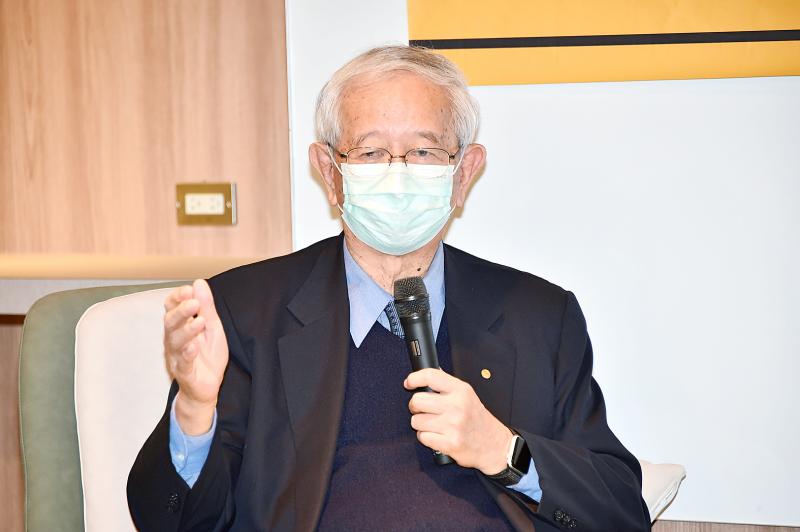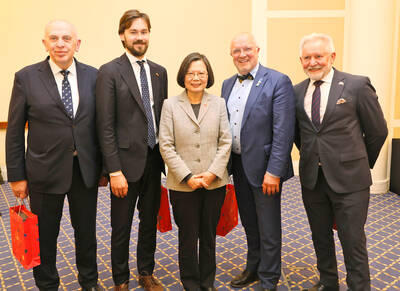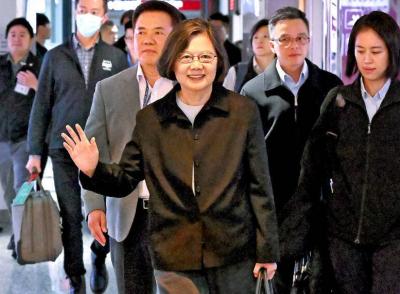Pork containing ractopamine residues within safe levels would not endanger human health, former Academia Sinica president Lee Yuan-tseh (李遠哲) said yesterday.
From Friday last week, US pork containing ractopamine — 0.01 parts per million (ppm) for meat, skin and other edible parts; 0.04 ppm for pig liver and kidney — are allowed to be imported, although there is still a ban on use of the leanness-enhancing feed additive on local pigs.
Speaking on the sidelines of a seminar on climate issues hosted by the New Power Party in Taipei, Lee said that many substances consumed by humans can be toxic if the levels are excessive, including sugar and sodium nitrate.

Photo: Tu Chien-jung, Taipei Times
It is “inconceivable” that pork containing the feed additive could occupy public attention for so long when other issues, such as air pollution and its link to lung cancer, need more input, he said.
Asked if people can eat pork products containing ractopamine within safe levels, Lee said: “Yes.”
When asked whether his view might be opposed by mainstream public opinion, Lee said in that case, it is likely that people do not always get the correct information.
A University of California biochemist years ago found that every kind of food contains carcinogens and has since been promoting the notion that “to eat is to die,” Lee said.
The biochemist wants people to realize eating is a process that leads to death and to be careful about the amount of specific foods they consume, he said.
Similarly, not all food imported from Japanese areas around the Fukushima Dai-ichi nuclear power plant after its 2011 disaster are problematic, he said.
Taiwan has banned food imports from five Japanese prefectures — Fukushima, Ibaraki, Tochigi, Gunma and Chiba — since the nuclear disaster, which was triggered by tsunami on March 11, 2011.
It is essential to examine if a food product is polluted by excessive radioactive isotopes, Lee said, adding that he is opposed to use of the term “nuke food,” as some media have reported.
The term “nuke food” sounds like it contains nuclear waste or something, which is not correct, Lee said.
Food products should be considered safe if they are found to be free of nuclear pollution, he said, adding that food safety checks are important.

Former president Tsai Ing-wen (蔡英文) on Monday called for greater cooperation between Taiwan, Lithuania and the EU to counter threats to information security, including attacks on undersea cables and other critical infrastructure. In a speech at Vilnius University in the Lithuanian capital, Tsai highlighted recent incidents in which vital undersea cables — essential for cross-border data transmission — were severed in the Taiwan Strait and the Baltic Sea over the past year. Taiwanese authorities suspect Chinese sabotage in the incidents near Taiwan’s waters, while EU leaders have said Russia is the likely culprit behind similar breaches in the Baltic. “Taiwan and our European

The Taipei District Court sentenced babysitters Liu Tsai-hsuan (劉彩萱) and Liu Jou-lin (劉若琳) to life and 18 years in prison respectively today for causing the death of a one-year-old boy in December 2023. The Taipei District Prosecutors’ Office said that Liu Tsai-hsuan was entrusted with the care of a one-year-old boy, nicknamed Kai Kai (剴剴), in August 2023 by the Child Welfare League Foundation. From Sept. 1 to Dec. 23 that year, she and her sister Liu Jou-lin allegedly committed acts of abuse against the boy, who was rushed to the hospital with severe injuries on Dec. 24, 2023, but did not

LIKE-MINDED COUNTRIES: Despite the threats from outside, Taiwan and Lithuania thrived and developed their economies, former president Tsai Ing-wen said Former president Tsai Ing-wen (蔡英文) on Saturday thanked Lithuania for its support of Taiwan, saying that both countries are united as partners in defending democracy. Speaking at a reception organized by the Lithuania-Taiwan Parliamentary Friendship Group welcoming her on her first visit to the Baltic state, Tsai said that while she was president from 2016 to last year, many Lithuanian “friends” visited Taiwan. “And I told myself I have to be here. I am very happy that I am here, a wonderful country and wonderful people,” Tsai said. Taiwan and Lithuania are in similar situations as both are neighbors to authoritarian countries, she

Former president Tsai Ing-wen (蔡英文) is to visit the UK during her ongoing European trip, which originally included only Lithuania and Denmark, her office said today. Tsai departed Taiwan for Europe on Friday night, with planned stops in Lithuania and Denmark, marking her second visit to the continent since her two-term presidency ended in May last year. Her office issued a statement today saying that Tsai would also visit the UK "for a few days," during which she is to meet with UK politicians and Taiwanese professionals, and visit academic and research institutions. Following Tsai's stop in Denmark, she is to visit the